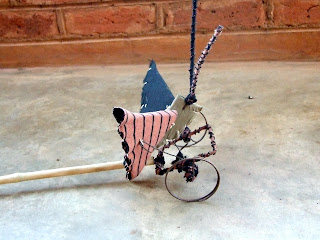I climbed Zomba plateau this weekend (about 5500' altitude) with some mostly Brits, two men and one of their wives, who teach Physics and Biology at St. Andrews School, a private, tuition-fed school in Blantyre. They were so smart and knowledgeable about Africa, the mountain, and the wildlife. One had been here 18 years, and I don't know about the other couple, but I seem to remember about 8-9 years. Also in the party was a Dutch female MD who is working with the HIV/AIDs afflicted, two filmmakers, and an Indian man who is a retired finance person who is here for 3 months working on a microloan initiative.
The Physics teacher and his wife are hobbyist wildlife photographers, and apparently, when one becomes somewhat knowledgeable about photography, you look for shots that "the rest of the world" doesn't also see. You look for that "unusual" shot or perspective. He was most proud of a nighttime shot of a fledgling owl that is indigenous to this area that was "catching its first fish." Apparently, it's important that it does not catch a fish that is too heavy for it because rather than let it go, it will cling to it and fall off its tree-branch perch and into the water to drown.
The couple publishes a wildlife calendar, and are active in the mountain climbing group, and the Society of Malawi organization - all having to do w/ social and cultural (such as they are) events. Two guys with the best food were filmmakers - they are here making a documentary for a mining company. Andy has made several African country documentaries and he was an interesting person with an interesting point-of-view. Lindsey, the Biologist's wife, said that the oral tradition of handing down history was dying here and that she wanted to make a recording of the oral history left by the older generation. I commented that companies were losing their histories by letting go of the the "first hired," and Andy commented that he thought the problem was institutional, which I thought was interesting.
I have so much respect for the scientists' knowledge and ability and impulse to "figure things out." We saw a native carrying a felled tree on his back while we were hiking the forested area (there were multiple bio-topographies) and the physics teacher, figured out how much it weighed by calculating the estimated length of the log and multiplying it by pi, which calculates the area of a circle. Then he figured the tree was softwood, had to be less than the density of water (will float), and with all of those basic formulae, he calculated in his head that the tree must weigh about 200 lb.
The Biology teacher, Martin, knew a lot about the flora and fauna - Monkey Tussel an interesting coniferous tree, brought in from South America and took over, and an elephant fern that waters itself during the dry season, from the rain it stores during the rainy season.
They all take self-driving safaris in Zambia, Namibia, Zimbabwe, and know from being insiders the places to go (Botswana, apparently, has exquisite safaris, keeps the gawker population down, and are quite expensive ($600 USD/night), but these established expats know how to do them less expensively, maintain the quality and see what they want to see. They all have vehicles, too, which makes a huge difference in their quality of life. Martin asked me if I was going to buy a vehicle while I was here and told him, "Not for 10 months." He said, "If you are smart, you could buy one and sell it for about what you paid for it." I am not sure I want to take that expense on, but it certainly would improve the quality of my life here. Rental vehicles are prohibitively expensive; the minibuses are dangerous and uncomfortable (20 crowded in a van that should accommodate 16; and the individual taxis for hire jack their prices way up so that they aren't good value for the money.)
Found the pool at Sir Harry Johnston International Primary School, within walking distance, and it's 50-meters, has designated swim lanes, is crisp, cool, and refreshing in this 95-degree heat, but is only about 2' deep. I swam a mile on Saturday and savored every cool stroke, even tho' when I did the flip turn to head back across the pool, I hit the bottom. I believe I will be swimming 2 miles by the time I return. That 18 laps was nothing for a non-smoker!



